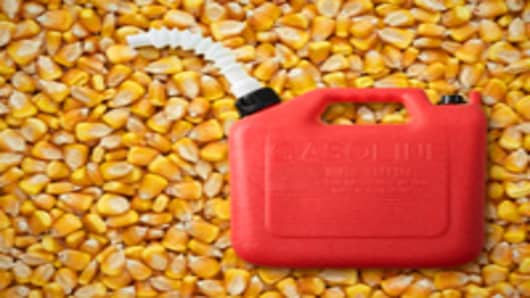The term “renewable fuels” bothers me. It sounds so environmentally responsible, so innocuous and so limitless. What could possibly be wrong with “renewable fuels”? As the CEO of a beverage company, I have come to realize that there is a dark side to renewable fuels and this year’s drought brings that into clear focus.
The basic problem is this: As a result of a Congressional mandate passed in 2005 and expanded in 2007, over 40 percent of this year’s greatly depleted corn cropwill be diverted from food and livestock, and instead be sold at the gas pump. We are trading our precious, fertile acres of farmland for a small dent in our oil usage. We are prioritizing our goal to reduce oil dependence over providing food to people.
Since the ethanol mandate was put in place, increasing amounts of corn have been diverted to its production. Last year, five billion bushels of a 12.4 billion bushel crop were diverted to ethanol production. The mandate increases the amount of ethanol that must be blended into gasoline each year and refiners are legally required to blend at least 15 billion gallons of corn ethanol annually by 2015.
Farmers have responded by increasing the amount of corn they plant with this year’s planted acreage hitting its highest level since 1937 at 96.7 million acres. The increase in demand has made this profitable for the farmer. But we don’t have unlimited acres to plant so some of the acreage has been diverted from other crops.
The real problem comes in a year like this year. The flash drought that has hit the Corn Belt has devastated the corn crop. What was expected to be the largest crop of corn ever only two months ago, now appears to be have the lowest yield per acre in 17 years and the smallest crop — despite the record acreage — since 2006. The price of corn on the futures market has skyrocketed — up 50 percent in only two months.
This increase has severe repercussions for our food supply. Livestock farmers — who have already lost grazing pasture to the drought — can no longer afford to feed corn to their cattle at the higher costs. Many choose to slaughter their herds prematurely, creating temporary moderation in the price of beef, but could create shortages that will take at least three years to correct. This will drive up the price of hamburgers, steaks, and so much more. Poultry producers face similar challenges, driving up the cost of eggs, chicken and other poultry products.
Companies like ours are faced with dramatic increases in the cost of corn we buy for use as a sweetener in our beverages. The price we are paying this year is up 19 percent and the short crop we are seeing will result in a similar increase in 2013. These costs cannot be absorbed easily and most end up getting passed on to consumers.
It does not have to be this way.
But it does not have to be this way. A June 2012 study by researchers at the UK Department for Environment, Food and Rural Affairs concluded that “reducing the [U.S.] blending obligation to one half of its current value in the same year as a spike in the global price of coarse grain, could reduce the magnitude of the spike by around 40 [percent].”
And the Environmental Protection Agency (EPA) has the right to reduce that obligation. Congress delegated to the EPA Administrator the authority to waive in whole or in part the requirement if it “would severely harm the economy . . .”
The drought we are experiencing — the worst in 50 years — and the consequential effect on the cost of food, at a time when our economy is already weak, would seem to merit a waiver. The United Nations Food and Agriculture Organization agreed and just last week issued a plea to the Obama Administration to issue a waiver — concerned about the potential for a worldwide food shortage. Their concerns go beyond the price of food in America to a basic concern that the U.S., the world’s largest exporter of corn to help feed the world, may consume too much as ethanol and not have enough to feed the world. (Related Links: Ag. Secretary - We're Committed to Assiting the Drought Stricken.)
In an election year, waiving the mandate could be tough because it has been popular with the ethanol production industry and the farmers who benefited from higher prices. But we are in the midst of a horrible drought in a tough economy. Insuring that we can feed people and do it at reasonable prices would seem to be a higher priority.
Billy Cyr is the President & CEO of the Sunny Delight Beverages Co., a manufacturer and marketer of juices, juice drinks and flavored waters under the Sunny Delight, Fruit2O, Veryfine, FruitSimple, Bossa Nova, Elations and Crystal Light brand names. Billy led the carve-out of Sunny Delight from Procter & Gamble in 2004 with the backing of the private equity firm JW Childs Associates.
CNBC and YPO (Young Presidents’ Organization) have formed an exclusive editorial partnership, consisting of regional “Chief Executive Networks” in the Americas, EMEA and Asia-Pacific. These “Chief Executives Networks” are made up of a sample of YPO’s unrivaled global network of 20,000 top executives from 120 countries who are on the frontlines of the economy and run companies which collectively generate $6 trillion in annual revenues.


